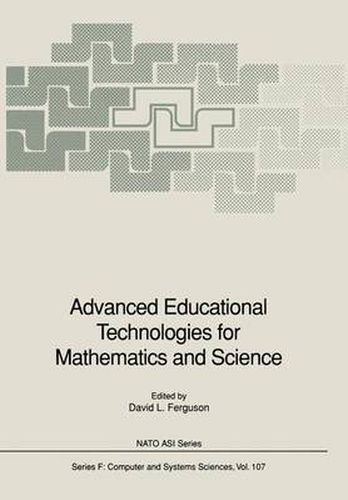Readings Newsletter
Become a Readings Member to make your shopping experience even easier.
Sign in or sign up for free!
You’re not far away from qualifying for FREE standard shipping within Australia
You’ve qualified for FREE standard shipping within Australia
The cart is loading…






This title is printed to order. This book may have been self-published. If so, we cannot guarantee the quality of the content. In the main most books will have gone through the editing process however some may not. We therefore suggest that you be aware of this before ordering this book. If in doubt check either the author or publisher’s details as we are unable to accept any returns unless they are faulty. Please contact us if you have any questions.
This book contains revised and updated versions of paperspresented at a NATO Advanced Research Workshop held inMilton Keynes, U. K. , in summer 1990. The workshop broughttogether about 30 world leaders in the use of advancedtechnologies in the teaching of mathematics and science. The papers demonstrate how technology is impacting the viewin the teaching profession of what should be taught, whatcan be taught, and how teachers should go about their workin the various disciplines. They offer great insight intothe central issues of teaching and learning in a wide rangeof disciplines and across many grade levels, ranging fromelementary school through college and undergraduateeducation. The book has two major parts, on advanced technologies inthe teaching of science and mathematics respectively,although many of the papers address topics of interest tospecialists in both areas. The papers reflect examples drawnfrom a wide range of fields, including mathematics, physics,computer science, engineering, chemistry, and biology. Somedemonstrate the use of software inteaching difficult butrestricted concepts within a discipline. Other show anintegrated approach that exploits the power of educationalsoftware throughout a course. The notions of discovery,representation, qualitative models for reasoning, modelbuilding, and the management of complexity are key elementsin numerous papers.
$9.00 standard shipping within Australia
FREE standard shipping within Australia for orders over $100.00
Express & International shipping calculated at checkout
Stock availability can be subject to change without notice. We recommend calling the shop or contacting our online team to check availability of low stock items. Please see our Shopping Online page for more details.
This title is printed to order. This book may have been self-published. If so, we cannot guarantee the quality of the content. In the main most books will have gone through the editing process however some may not. We therefore suggest that you be aware of this before ordering this book. If in doubt check either the author or publisher’s details as we are unable to accept any returns unless they are faulty. Please contact us if you have any questions.
This book contains revised and updated versions of paperspresented at a NATO Advanced Research Workshop held inMilton Keynes, U. K. , in summer 1990. The workshop broughttogether about 30 world leaders in the use of advancedtechnologies in the teaching of mathematics and science. The papers demonstrate how technology is impacting the viewin the teaching profession of what should be taught, whatcan be taught, and how teachers should go about their workin the various disciplines. They offer great insight intothe central issues of teaching and learning in a wide rangeof disciplines and across many grade levels, ranging fromelementary school through college and undergraduateeducation. The book has two major parts, on advanced technologies inthe teaching of science and mathematics respectively,although many of the papers address topics of interest tospecialists in both areas. The papers reflect examples drawnfrom a wide range of fields, including mathematics, physics,computer science, engineering, chemistry, and biology. Somedemonstrate the use of software inteaching difficult butrestricted concepts within a discipline. Other show anintegrated approach that exploits the power of educationalsoftware throughout a course. The notions of discovery,representation, qualitative models for reasoning, modelbuilding, and the management of complexity are key elementsin numerous papers.